Family Shepherds
I began to contemplate parenting while working with children and families in an inner city community, before I had any children of my own. Even then, I began to wonder how parents could successfully guide their children through such a dangerous maze of worldly distractions. I began to study this question even more when my wife announced that she was pregnant with our first daughter. And, I have continued my contemplation of parenting as my children have grown and matured. I’m sure I will still be trying to figure it out when they graduate from college, get married, and have children of their own. Throughout my study of parenting, I have discovered many great thinkers and writers offering amazing advice. Some of the most important lessons for me included “emotional coaching” (John Gottman), relational parenting (Sears), reality discipline (Kevin Leman), good enough parenting (Winnicott), authoritative parenting (Baumrind), shepherding a child’s heart (Tripp), natural and logical consequences, and democratic and respectful parenting (Adler). I was also challenged to “Dare to Discipline” (Dobson) and instill crucial life values into my children’s lives (Rice). Each idea provided important knowledge and excellent advice, invaluable insights and great helps.
provided important knowledge and excellent advice, invaluable insights and great helps.
 provided important knowledge and excellent advice, invaluable insights and great helps.
provided important knowledge and excellent advice, invaluable insights and great helps. In the final analysis I came to the conclusion that God is the Perfect Father and the greatest example of parenting. I want to father like Him, parenting in His image. As I thought about God as Father over the years, my mind kept returning to Psalm 23. In this Psalm, the writer gives a succinct model of God as a shepherd caring for his sheep, providing principles for guiding our children through the dangers of this life and into maturity. I realized that I wanted to follow those principles and become a family shepherd, parenting my children just as God shepherds His sheep.
Briefly consider a few of the principles noted in Psalm 23:
· A shepherd meticulously and generously provides for the needs of his sheep.
· The shepherd goes before his sheep to prepare a safe haven for them. He even works with the environment to make it as safe and nurturing as possible.
· At the same time, a good shepherd disciplines his sheep to keep them safe. He trains them to obediently follow him. The shepherd does all of this in hopes that his sheep will someday obey naturally–not because he holds the discipline but because they have learned the benefit of obedience and the sufficiency of his love. The sheep will have internalized the shepherd’s leading in response to his love and nurturance.
Yes, parents are the family shepherds. They nurture, provide, protect, lead, train, and discipline. They become students of their children, learning how to best lead them toward maturity. Family shepherds lovingly provide for their children’s needs–physically, mentally, and spiritually. I hope you will join me as we explore practical “family shepherding” principles in upcoming blogs of the “Family Shepherd.” If there are parenting issues you would like to see addressed, be sure to suggest it in the comment area.